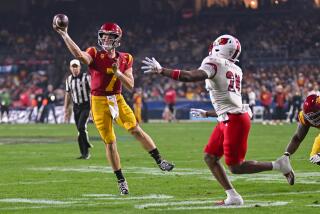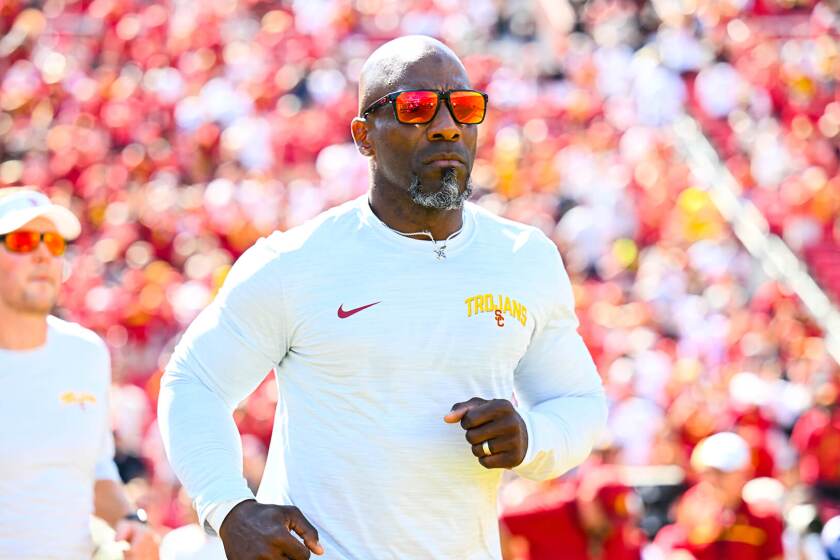A Formula for Success? BCS Simplifies System
- Share via
College football leaders unveiled Thursday a rankings system they say will simplify what had been made complicated: the process of determining a national champion without a playoff.
For USC fans, the alterations come a year late.
Had they been in place before last season, the changes would have matched USC against Louisiana State in the Sugar Bowl for the undisputed national championship.
Then again, the new system, adopted and approved by 11 conference commissioners, was fast-tracked into reality for the very reason USC did not face LSU.
College football in 2003 endured its most controversial finish in the bowl championship series era when USC finished No. 1 in the writers’ and coaches’ polls but third behind Oklahoma and LSU in the BCS standings, a multipronged formula used to match the top two teams for a “national championship.”
The result was split titles, the very thing the BCS was created in 1998 to prevent.
USC claimed the Associated Press title by defeating Michigan in the Rose Bowl; LSU earned the coaches’ trophy by beating Oklahoma in the Sugar Bowl.
The new system, fine-tuned and vetted for months, will give more power to human polls, diminish the role of the computers and eliminate the strength of schedule, quality wins and loss-record components of the formula.
It will give one-third weight to three components: the two human polls and the computers.
In essence, this all but assures a team that is ranked No. 1 in both human polls will play in the BCS title game.
“By putting significantly more weight on human polls, we have taken an important step toward eliminating some of the controversy of the past few years,” new BCS coordinator Kevin Weiberg said.
Oklahoma finished No. 3 in both human polls last year but had enough of a lead over USC in the computer component to remain No. 1 in the final BCS standings at the end of the regular season.
LSU edged USC for No. 2 by the margin of .16.
Had the new system been in place last year, LSU would have finished first in the BCS and played No. 2 USC in the Sugar Bowl.
The new BCS formula will assign a point value to a team’s ranking in each of the human polls and the computers. There will be six computers used next year instead of seven, the New York Times having announced recently it would no longer participate.
A team’s high and low computer ranking will be discarded, with a point total calculated on the remaining four rankings.
A team’s three point totals (AP and coaches polls plus computers) will be averaged.
Applied and adjusted to last year’s rankings, LSU would have finished first with a total of .964, followed by USC at .960 and Oklahoma at .942.
Also, using the new system, consensus No. 2 Oregon, not Nebraska, would have played No. 1 Miami for the national title in 2001.
“We want to get this right,” Weiberg said of the new standings.
“We want to have as much consensus around the teams participating in the national championship game as we possibly can.”
Since their creation in 1998, the BCS standings have been modified so many times the weekly standings were released with a lengthy explanation.
“I think we probably did get caught up in the early years in trying to tweak the formula by adding elements to it that, unfortunately, made it more complex and became part of the problem rather than part of the solution,” Weiberg said.
Although the new BCS formula will prevent a repeat of last year’s fiasco, it does not guarantee a clear-cut path to determining a national champion.
There will still be controversy should three teams finish the season undefeated or with one loss.
Also, pushing more responsibility on the human polls has problems, particularly given that the coaches are not required to publicly reveal their votes.
Many would also argue that the human element is inherently flawed because the AP and coaches publish a preseason top 25 before any school has played a game.
These top rankings, many say, are sometimes based on reputation rather than actual potential.
“We can’t claim it’s going to eliminate all the potential for controversy,” Weiberg said of the simplified formula. “We think there’s great improvement in a simpler and more precise system.”
More to Read
Go beyond the scoreboard
Get the latest on L.A.'s teams in the daily Sports Report newsletter.
You may occasionally receive promotional content from the Los Angeles Times.







